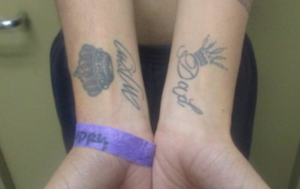In the weeks before March 15, the Trump administration’s preparations for a major operation kicked into high gear. Venezuelan men attending routine check-ins with U.S. Immigration and Customs Enforcement ended up leaving in handcuffs. ICE agents fanned out across communities and began questioning and detaining men with tattoos. By the week of the March 10, several hundred men found themselves transferred to the El Valle detention center in Texas’ Rio Grande Valley, where ICE officers told them they were going to be deported back to Venezuela.
All of this culminated on March 15, when the Trump administration rushed nearly 300 people onto three planes bound for El Salvador, including 238 Venezuelans accused of being members of the Venezuelan gang “Tren de Aragua” and 23 Salvadorans accused of being members of MS-13. Over 130 Venezuelans had pending immigration court hearings and had never been ordered removed under immigration law. They were sent to El Salvador as part of President Trump’s invocation of a 1798 wartime law known as the Alien Enemies Act, and under a deal worked out between Secretary of State Marco Rubio and El Salvador’s president Nayib Bukele.
None of the people on board knew what was coming, nor were they given any opportunity to raise objections in a court of law. All of these men are now being held incommunicado in El Salvador’s notorious “CECOT,” or Terrorism Confinement Center. A Time photojournalist who happened to be on hand described how the men had their heads shaved, were stripped naked, and struck by guards, with one man reported to have sobbed, pleading with guards, “I’m not a gang member. I’m gay. I’m a barber.” Since that moment, none of the men have been able to speak to the public, their loved ones, or their lawyers. Their fate remains unknown.
No person should be sent to rot in a prison in a foreign country they have never been to and without having been convicted of any crime that might justify imprisonment. This principle is especially relevant now, because the details of this operation that have emerged in court filings and media reporting makes clear that the operation was plagued with errors and oversights that sent innocent people to one of the world’s worst prisons. At least 10 people put on the planes should not have been there; eight women and one Nicaraguan man who El Salvador rejected, and one man whose deportation ICE admitted was unlawful and the result of an “administrative error,” as he had previously been granted protection from deportation to El Salvador. Families, loved ones, and friends of dozens of others have said that the imprisoned men had no connections to gangs or to any criminal behavior at all.
The cases that have been highlighted so far raise two major problems with this unprecedented operation: there were egregious government errors and reliance on flimsy gang allegations that were never presented before a court of law. These flaws emphasize the need for a formal investigation of the March 15 operation, and underscore why disregarding due process leads to immediate, irreparable harms for people and threatens the basic rule of law principles core to this country’s founding. Multiple cases strongly suggest that the government wrongfully sent many people to this El Salvador mega prison:
- The case of a Maryland father of two, Kilmar Abrego, who was granted protection from deportation to El Salvador in 2019 by an immigration judge. As an investigation by the Atlantic shows, he spent the last five years living a quiet life in a Maryland suburb with his U.S. citizen wife and their children, until he was re-arrested on March 12 and sent to El Valle on the basis of unsubstantiated allegations made in 2019 that he was connected to MS-13. Even though ICE knew he legally could not be deported to El Salvador, he ended up placed on the flight at the last moment as the manifest was finalized. This was, as ICE declared in a court filing, an “administrative error” – one that sent him directly to El Salvador’s worst prison.
- The case of Frengel Reyes, who was deported to El Salvador despite having no tattoos, criminal history, or any possible connections to Tren de Aragua. A Miami Herald investigation found that ICE officers may have accidentally copy-pasted information into his file from a different person, as the sole ICE document accusing him of being a gang member lists the wrong last name in multiple places and contains two separate identification numbers.
Mr. Abrego’s case is the first where the government has admitted error, but not the first where errors were likely made. Evidence continues to emerge that the Trump administration’s rush to carry out splashy Alien Enemies Act deportation flights led to many such “errors,” oversights, and serious mistakes. ICE itself has admitted that “many” of the men had no criminal record in the United States but alleges that its evidence of gang ties were robust—even though they did not offer that evidence in a court of law prior to these removals.
Importantly, evidence filed in court after the operation suggests that much of ICE’s “verification” process was based on highly subjective interpretation of tattoos and social media posts — a troubling process given that experts on Tren de Aragua and even some federal law enforcement sources themselves argue that the gang does not even use tattoos or hand signs as identifying marks.
Making matters worse, key government “intelligence” documents circulated to low-level officers to help them identify so-called “Tren de Aragua tattoos” was populated with random images of tattoos taken from the internet sourced from around the world. The cases below show how subjective these interpretations are:
- The case of Andry Hérnandez, a gay makeup artist, who was deported to El Salvador after an ICE officer determined that his tattoos reading “mom” and “dad” were likely gang tattoos because they had a crown over each word. As a New Yorker investigation noted, Mr. Hérnandez comes from a town in Venezuela famous for its annual Three Kings Day festival honoring the birth of Jesus Christ. The festival uses a crown as a principal symbol. Despite this innocent explanation for his tattoos, an ICE officer declared that the tattoos were “consistent with those of a Tren de Aragua member.”

The tattoos which led Andry Hérnandez to be detained and deported to El Salvador, according to documents filed in court.
- The case of Neri Alvarado, a baker living in Dallas since 2023, who was deported to El Salvador for unknown reasons. As a Mother Jones investigation found, after he was arrested, ICE officers specifically told him that they were detaining and interrogating all Venezuelans with tattoos. Mr. Alvarado’s most prominent tattoo is a rainbow autism awareness tattoo in honor of his 15-year-old autistic brother. He told a close friend that an ICE officer had reviewed his tattoos and social media and told him that there was no connection to Tren de Aragua — yet he was detained and deported anyway.
- The case of Jerce Reyes, a Venezuelan professional soccer player who was sent to El Salvador despite having no criminal record, because ICE agents determined that his tattoo of a soccer ball with a crown on it, along with a social media image of him “throwing the horns,” was evidence of a connection to Tren de Aragua. The person who tattooed Mr. Reyes confirmed to CNN that the tattoo was in honor of his favorite soccer team, Real Madrid, which has a similar logo.
These stories are just a few of the nearly two dozen detailed accounts which have emerged since March 15. The common through-line for many of these is a lack of real evidence of any connections to gangs beyond just a tattoo, a hand sign, or proximity to someone else labeled a gang member. And while the White House continues to insist that there was a “rigorous” process for vetting people placed on the plane, the Trump administration has so far refused to provide even a single piece of evidence backing up its claims — and has gone so far as to invoke the “state secrets” doctrine in an effort to shroud its actions from judicial oversight.
As of today, there are nearly 300 people being imprisoned in El Salvador at U.S. request. They have never been convicted of any crime that would justify their indefinite imprisonment (many have no criminal record at all). They also received no due process in the United States, and were denied any opportunity to challenge the evidence presented by the government — or even to argue that there was no evidence at all, just paperwork mistakes and “administrative errors.” As more and more evidence of wrongdoing emerges over the March 15 deportations, it’s clear a full investigation is necessary.
Banner image by Comisión Interamericana de Derechos Humanos
FILED UNDER: El Salvador, Trump administration


